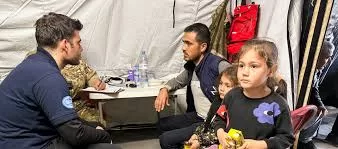Recognizing that health and care workers (HCWs) stand on the frontline of health crises, WHO/Europe has launched a new toolkit to support Member States in involving and preparing HCWs for such situations. The toolkit recognizes that HCWs are not just caregivers, but also trusted messengers, community anchors and agents of change – traits that are especially vital during times of emergency.
Leveraging the role of HCWs in emergencies
The COVID-19 pandemic underscored the necessity of engaging HCWs as key partners in promoting protective health behaviours, such as vaccination, sanitation and other preventive measures, while also playing an essential role in countering false narratives.
During emergencies, they are essential voices for delivering health information and advice, engaging with communities, and managing infodemics. As trusted influencers, they significantly impact public behaviour, with individuals more likely to adopt health-protective measures when HCWs serve as messengers or role models.
In addition, HCWs are advocates for vulnerable and underserved populations, ensuring no one is left behind in emergency responses by promoting health equity and providing essential care, regardless of socioeconomic status or location.
Being deeply embedded in the communities they serve, HCWs have an intimate understanding of local cultures, values and social dynamics, enabling them to tailor health interventions in ways that resonate with community needs.
Tomas Zapata, WHO/Europe’s Health Workforce and Service Delivery Team Lead, stresses that engaging HCWs during health emergencies is not merely an operational necessity, but a moral imperative: “Health and care workers are instrumental in bridging the gap between health services and communities, to ensure that health-care strategies are both effective and culturally sensitive.”
He continues, “Policy-makers and health authorities must prioritize investment in health workforce training and well-being to build health systems capable of withstanding future health crises.”
Challenges for HCW engagement
Josephine Declaye, Policy Officer for the European Specialist Nurses Organisation (ESNO) in Belgium, explains that despite their pivotal role, HCWs face significant challenges that can impede their effectiveness in emergencies. They are often overworked and operating with limited resources, with little time or support for meaningful community engagement.
“The reality is that nurses and health-care workers are so immersed in their daily responsibilities that stepping up to participate in decision-making and advocacy can feel overwhelming. But I believe that nurses have unique insights – solutions that are born from our daily experiences on the frontlines – and that’s where real change will come from,” she says.
HCWs must also contend with pervasive false information that undermines trust in health systems and recommended measures, such as vaccination, that are designed to protect communities. The psychological toll of working in high-pressure environments adds another layer of anxiety, highlighting the urgent need for robust support systems to safeguard the emotional and mental well-being of HCWs and ensure their continued ability to serve communities effectively.
Preparing HCWs for the next health emergency
Beyond the COVID-19 pandemic, HCWs in the WHO European Region have stepped up to the mark to deal with a range of health crises, such as long COVID, mpox and the Ukraine war. Inevitably, the future will bring new health threats, and the engagement of HCWs will continue to be vitally important. To support Member States with this, WHO/Europe’s new toolkit outlines strategies for engaging HCWs and highlights their significant role across the emergency cycle.
Cristiana Salvi, WHO/Europe’s Regional Adviser on Risk Communication and Community Engagement and Infodemic Management (RCCE-IM), explains, “In the ever-evolving landscape of health emergencies, the ability of health and care workers to skilfully communicate risks and protective measures, counter false information and actively engage communities stands as the next compelling competency.”
This is why WHO/Europe has launched a project to integrate RCCE-IM curricula into medical programmes, ensuring HCWs are equipped with these essential skills to effectively respond during emergencies.
The toolkit outlines the following actionable strategies to empower HCWs and enhance their contributions to emergency responses.
- Building capacity and providing tools: Equip HCWs with resources such as step-by-step communication guides and infographics to simplify health messaging. These tools can be co-created with HCWs to ensure they meet on-the-ground realities.
- Fostering 2-way communication: Establish feedback mechanisms that allow HCWs to share insights and concerns with health authorities. This participatory approach ensures policies are responsive and inclusive.
- Offering emotional and logistical support: Address HCWs’ well-being by providing mental health services, child care and housing support during emergencies, recognizing that these boost morale and rates of retention.
- Promoting health literacy: Train HCWs to effectively communicate complex health information in accessible ways, fostering trust and informed decision-making among communities.
- Engaging HCWs as influencers: Encourage HCWs to leverage their positions as trusted community figures. It is important to provide them with platforms to share health advice, counter misinformation, and model protective behaviours.












